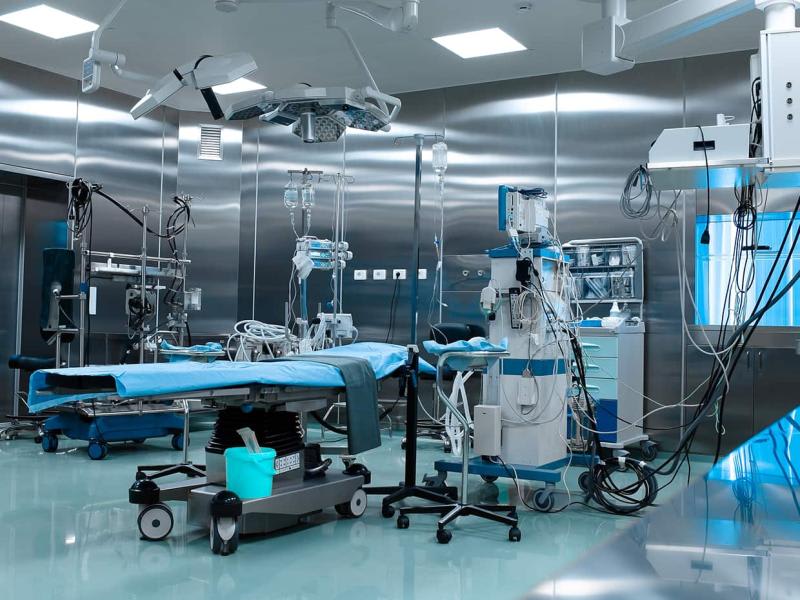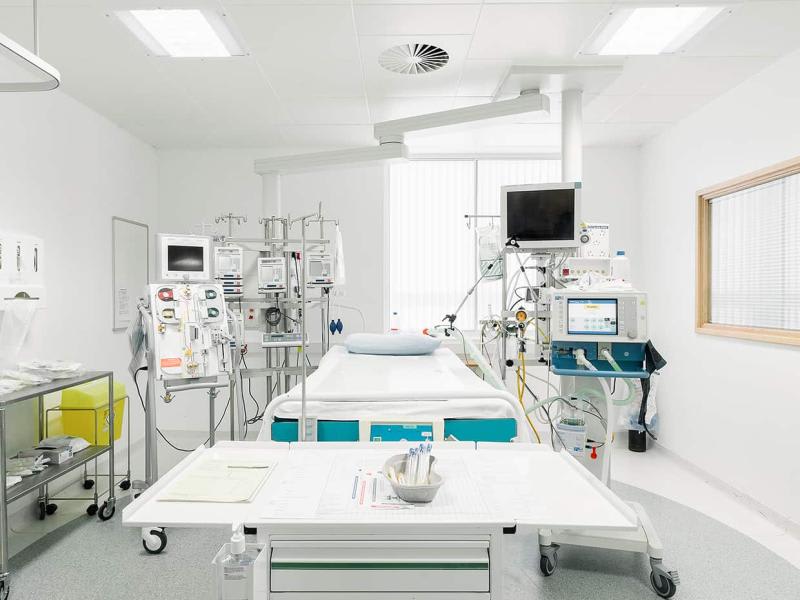Artificial intelligence (AI) has the potential to provide a wide range of possibilities to enhance patient care and streamline healthcare processes that could revolutionise the healthcare industry and how care is delivered.
The benefits are still early in concept. But even in these early stages, there are a wide range of opportunities for resource-strapped health organisations to explore - from reducing physician administrative time to bringing virtual hospital wards to fruition and even helping with diagnoses.
However, while the potential benefits are considerable, it is critical to be aware of some of the risks and to manage AI implementation in healthcare with caution. Concerns about data protection, and potential biases that might be unintentionally built into AI platforms are among some of the risks that could pose serious problems in patient care.
Learning to walk before we run with AI in healthcare is essential. Low-risk settings for implementing such technology are already being identified and creating significant benefits for the industry – as well as opportunities to better understand the challenges.
This article taps into the expertise of RSM UK Partner and Head of Healthcare Clive Makombera, who shares his views on AI, particularly ChatGPT, in healthcare and the benefits it could bring to patients, doctors, researchers, and healthcare providers. It also addresses potential risks and challenges associated with AI adoption, and how RSM specialists in technology and healthcare are helping to implement complex systems in impactful ways.
Potential AI applications in healthcare
With increased prominence and ease of access, the public at large is starting to become more aware of AI in everyday settings. There are a number of generative AI chatbots - or Large Language Models (LLMs) – in use today. Arguably, OpenAI’s ChatGPT model is the most well-known.
Applications like this have the potential to be used to enhance patient care and provide real-time insights into a patient's health status. Its generative nature means it is capable of creating human-like responses to a wide range of queries, making it an ideal tool for healthcare applications. From personalised treatment plans to remote patient monitoring, ChatGPT and similar applications could transform the way healthcare providers deliver care to their patients.
1. Triage, and tailored care support:
AI, including ChatGPT, can be used to help patients with managing their medication including with alerts reminders, dosage to be taken, and potential side effects. AI enables clinicians to ask relevant questions about symptoms and medical history, it can also be used to help determine the urgency and acuity of a patient's physical or behavioural condition and, where relevant, suggest measures for support. For example, it can triage and score patients in order of need in emergencies rooms, and can screen for mental health conditions, allowing medical professionals to offer coping strategies, and connect patients with resources for further support.
Meanwhile clinicians can use these types of AI as a virtual assistant, supporting the scheduling of telemedicine appointments, managing health information and generating medial reports and discharge summaries. This is a sophisticated process that is tailored using physicians’ expertise to create the right questions for data mining – and through this automation, physicians can in turn spend more time with patients, which is a win. They can also use it to support clinical decisions, by asking for evidence-based recommendations to improve patient outcomes, saving time and reducing errors. And, as ‘virtual wards’ and remote patient monitoring (RPM) become more commonplace to help ease the pressure on medical facilities like hospitals, AI technologies can support medical professionals with care coordination, and the delivery of rehabilitation and physical therapy closer to home or from the comfort of the patient's own home.
Another key area where generative AI like ChatGPT can benefit both patients and doctors, is in translation services. The software can facilitate real-time translations to empower more effective communication and understanding between both parties – potentially allowing for the root cause to be identified sooner, or to reduce the risk of patients misunderstanding their diagnoses and prescriptions.
2. Trendspotting and research:
From a medical research perspective, AI, including ChatGPT, can accelerate the scientific discovery process by aiding researchers in designing experiments, conducting peer reviews, and collaborating on bids.
Trend analysis can benefit from AI being used to detect patterns and anomalies to enable the early identification of emerging diseases or pathogens, as well as providing automated alerts to public health officials, healthcare providers, and the general public, empowering them to take appropriate measures to prevent the spread of disease.
Using AI to reduce the pressure on medical professionals, and save time on tasks such as reporting, can have a positive impact on the workforce. AI could be used to redirect patients to receive follow-ups from different departments where relevant, which can mean as much as an 85% reduction in physicians’ patient inboxes. By helping to balance physician workloads more efficiently, the risk of burnout and turnover is reduced.
Risks and challenges
However, as with any nascent technology, there are often grey areas which require further understanding and clear guidance – therefore, proceeding with caution is advised. At the moment, we are working closely with healthcare organisations as consultants to identify potential risks as well as mitigating controls, focusing on some of the following areas.
1. Data security
With the rise of ChatGPT and other AI tools, there are question marks around the potential impact on data security and privacy. In May 2021, it became known that a data breach had occurred at the Health Service Executive (HSE) in Ireland, and the personal details of thousands of service users of had been extracted – resulting in disruption to the entire Irish Heath System.
Ensuring privacy is crucial for maintaining trust and mitigating potential risks associated with AI implementation, and so it is critical that any healthcare provider has clear processes and cybersecurity measures, as well as a clear agreement in place with its supplier, to protect patient data from breaches.
2. Risk of disinformation
ChatGPT gathers its information from diverse sources available on the internet, including books, articles, websites, and other textual content. It does not have direct access to specific sources of information, nor can it gather information from the internet in real-time. These limitations increase the risk of disinformation – as we know the internet does not always contain reliable sources.
In order to maintain the highest standards of evidence in healthcare, AI must be seen as a supporting tool, rather than a leading decision maker. Information or responses provided by ChatGPT should always be verified and cross-checked with up-to-date and reliable sources, and considered in tandem with human, professional insight.
3. Interoperability and data sharing
Interoperability is a critical component of today’s healthcare infrastructure, and this will only continue to grow in importance as technology advances. However, AI platforms might have unintended consequences such as biases, discrimination, ethical and medico-legal impacts which could make sharing data between platforms and networks and having ‘one version of the truth’ more cumbersome than it already is. Some of the clinical, quality and safety issues include:
- Erroneous predictions —a change of environment or circumstance can result in erroneous predictions.
- Lack of emotional intelligence — AI doesn't yet have the ability to take into account false negatives or false positives.
- Subjective bias — an AI machine designed to detect a certain illness maybe biased toward the outcome it is designed to detect.
- Clinical complacency — clinicians may start to trust AI outcomes implicitly, assuming all predictions are correct without verification or looking at alternatives.
- Oversight overload — because AI systems are capable of carrying out multiple tasks and activities, monitoring predictions could become near impossible.
4. Capital investment and return on investment (ROI)
Lastly, the full potential of AI can only be unlocked with increased interoperability across equipment. However, the costs associated with acquiring new equipment, including wearables and ambient sensors, and the installation of high-end connections like 5G to ensure the effective, uninterrupted use of such tools, is vast. This spend must be carefully evaluated to determine the return on investment – especially if healthcare providers hope to make further investment in the future.
Dr Rachel Iredale, Clinical Consulting Director at RSM Ireland added that ChatGPT, and competitors like Meta’s LLAMA, and Google’s Bard, have the potential to be significant technological gamechangers for healthcare. Recently, a beta version of a ChatGPT tool, ‘DocsGPT’, was launched which allows doctors to automate administrative tasks such as the drafting of medical letters to insurance companies, using an AI-based writing assistant.
In addition, the synergies of combining other technology such as virtual reality (VR) and augmented reality (AR) presents a potential disruptive shift in healthcare, including the potential for better surgical precision, therapeutic utilisation, patient care, healthcare training and more.
However, it is vital to approach its implementation with caution, addressing risks related to data security, bias, disinformation, interoperability, and financial considerations. Creating automation strategies, by leaning on expertise from leaders in the field can help to establish processes behind use cases and establish financial value. By embracing AI opportunities while maintaining a measured approach, the healthcare industry can leverage AI's potential to enhance patient care, streamline clinical systems and processes, and drive advancements in medical research.





